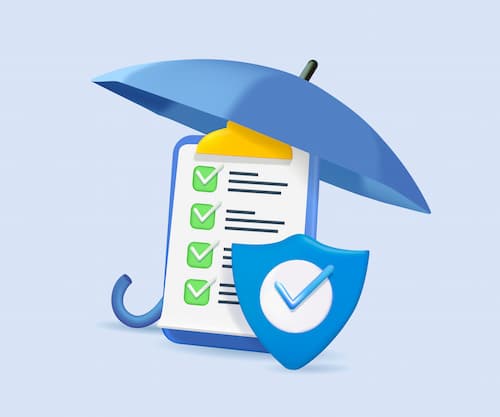How to file an insurance claim after a hurricane
Follow these steps to file a hurricane damage insurance claim.
- Document the damage to structures and personal property. Here are some tips:
- Take pictures. Before and after pictures are key. It’s a good idea to have before pictures of your home and property on hand. This helps the insurance company gauge the amount of damage the storm caused. This applies whether you live in a storm-prone area or not.
- Write detailed notes. Make a list of all damaged property and items.
- Take videos during and after the storm if possible.
- Collect serial numbers and receipts. If these can be salvaged, they will help with your claims.
- Contact your insurance company. Call your insurance agency right away to start the hurricane insurance claim process, don’t wait. There should be a claims number on your policy or online.
- Confirm your hurricane deductible. Several states have what’s called a hurricane deductible for homeowners insurance. In high hurricane-risk areas, this deductible applies and is a percentage of your home’s value. You must pay this amount before the insurance company kicks in their portion.
- Get repair estimates in writing. Your insurance company will want any repair estimates in writing. Sometimes, they will recommend a repair shop, other times you can choose.
- Understand your coverage. Before an emergency hits, read your policy and know what’s covered. Review your coverage with your insurance agency and make any updates before storm season. Most insurance companies won’t sell additional coverage once a storm warning is in effect.
Remember that a hurricane causes widespread damage, leaving insurance companies inundated with claims. It may be difficult to get through on the phone. Check the insurer's website to find out if they have a mobile unit in the area or for additional information on getting in touch.
Which policy should you file a hurricane claim against?
What’s covered depends on what type of coverage you have, and you may need to file several claims depending on what was damaged and how. Here’s a quick look at what common policies cover so you’ll know where to file.
Homeowners insurance and condo insurance
Homeowners insurance covers structural damage to your home, garage and sheds and personal property inside the home, and often pays for things like a hotel if your house becomes uninhabitable.
If you own a condo, the damage will be split between the HOA’s policy, which covers the structure and any common areas, and your condo policy, which covers your personal property. Because condo association rules vary, there may be some differences in terms of which policy covers what.
Homeowners insurance does not cover flooding. In all cases, you must have a separate flood insurance policy.
Renters insurance
Renters insurance covers your personal belongings for hurricane-related damage, with the same exception as homeowners. Renters insurance doesn’t cover flooding damage to your belongings– you must purchase a separate flood policy.
Your landlord’s homeowners policy covers damage to the building. You are not responsible for damage to the roof, exterior siding, windows or any other part of the structure.
Car or motorcycle insurance
Car insurance covers hurricane damage from things like falling tree branches, hail and non-collision-related damage if you have opted for comprehensive insurance coverage. The same applies to a motorcycle insurance policy or any other vehicle damaged in a storm.
Flood insurance
Flood insurance is the only type covering major water damage from overland flooding, mudslides and excessive rain. Please note that flood insurance has exclusions. It generally doesn’t cover damage to landscaping, cars, outdoor structures, finished basements or pools, so always read up on what each of your policies covers.
When should you file a hurricane insurance claim?
Call your insurer immediately to start the claims process after a storm. If it’s a major disaster, they may have mobile units set up to respond quickly.
It can be hard to tell just how bad the initial damage was after too much time has passed, so some insurance companies will consider it negligence on your part if you wait and allow your home to get worse. This could result in claim denial. In fact, it’s a part of your insurance contract that you must report the damage quickly and that you must do whatever you can to prevent further damage.
The claims process can take a while, especially after a natural disaster when so many other people are filing claims. It’s best to take action quickly.
How long after a hurricane can you file a claim?
Many states have implemented a claims deadline for natural disasters such as hurricanes. For example, Florida gives you a year to file your paperwork. Louisiana, however, instituted a 180-day deadline. Check with your insurance company or local insurance board.
How to deal with an insurance adjuster after a hurricane
Cooperating with your adjuster is important to a smooth claims process. Ask the adjuster key questions on the phone or when they come to visit:
- How long will the claims process take?
- Are there any important deadlines for paperwork that you have to meet?
- Should you make any temporary repairs?
Document all your damage so the adjuster has photos and if possible, videos of what’s damaged. Have an inventory of all the items– a written list and/or receipts if they could be salvaged.
Remember, if you don’t agree with the decision the adjuster and the insurance company make, whether it’s a claim denial or a settlement that’s too low, you can file an appeal.
FAQ: Hurricane claims
How soon can you expect a hurricane claim to be settled?
It depends. It could take a matter of weeks or in some cases, months. While there are state laws that determine how long an insurance company has to settle a claim, hurricanes cause widespread damage with many claims in progress and the process can be slowed..
How can FEMA help file a hurricane insurance claim?
FEMA can sometimes help with gaps if your insurance doesn’t cover certain damage. Check with your local state agency. If you purchased your policy through the National Flood Insurance Program (NFIP), they can help with the claims process.
Should I make temporary repairs before the adjuster arrives?
You should make temporary repairs as long as they can be done safely. Make any repairs that will prevent further damage to the home.




